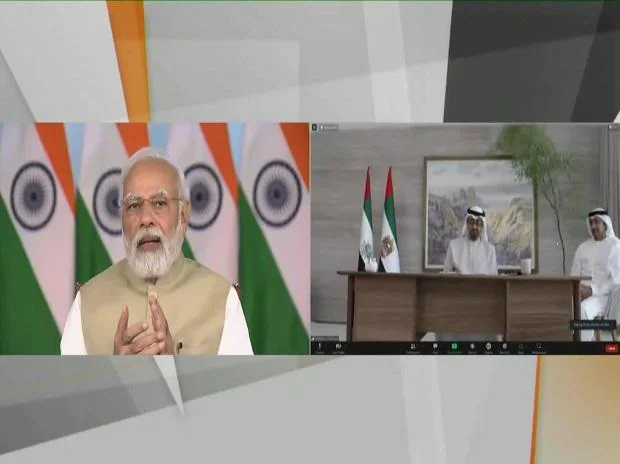India will “provide appropriate land for the project and will facilitate farmers’ integration into the food parks” while American and Israeli private companies will assist in the projects that will “help maximise crop yields and, in turn, help tackle food insecurity in South Asia and the Middle East.”
New Delhi: Prime Minister Narendra Modi, United States President Joe Biden, new Israeli Prime Minister Yair Lapid and United Arab Emirates (UAE) President Sheikh Mohamed bin Zayed Al Nahyan participated in the first ever four-nation India-Israel-US-UAE (I2U2) virtual summit on Thursday, July 14, that focused on food security and clean energy, a report in the Deccan Chronicle.
At the summit it was decided that the oil-rich UAE would invest US $2 billion to develop a series of integrated food parks across India that will incorporate state-of-the-art climate-smart technologies.
India will “provide appropriate land for the project and will facilitate farmers’ integration into the food parks” while American and Israeli private companies will assist in the projects that will “help maximise crop yields and, in turn, help tackle food insecurity in South Asia and the Middle East.”
Later, at a special briefing, foreign secretary Vinay Mohan Kwatra said states where these food parks may be set up include Gujarat and Madhya Pradesh.
He added that these food parks would benefit small and marginal farmers in India and raise farmers’ incomes. He said food crops could include rice, potatoes, onions and bananas.
Also, it was decided at the summit that the I2U2 would advance a “hybrid renewable energy project” worth US $330 million at Dwarka in Gujarat “consisting of 300 megawatts of wind and solar capacity complemented by a battery energy storage system.
“The project will help achieve India’s goal of achieving 500 GW of non-fossil fuel capacity by 2030. In a joint statement, the I2U2 said “such projects have the potential to make India a global hub for alternative supply chains in the renewable energy sector.”
Referring to the I2U2 grouping founded last year as a “unique grouping of countries,” the four nations said this “aims to harness the vibrancy of our societies and entrepreneurial spirit to tackle some of the greatest challenges confronting our world, with a particular focus on joint investments and new initiatives in water, energy, transportation, space, health, and food security.”
Also, it was decided at the summit that the I2U2 would advance a “hybrid renewable energy project” worth US $330 million at Dwarka in Gujarat “consisting of 300 megawatts of wind and solar capacity complemented by a battery energy storage system.
In his remarks, Mr Modi said the I2U2 has adopted a constructive agenda which is “positive and practical”, adding that the grouping has identified joint projects and the roadmap to move ahead and has also decided to increase joint investment in these sectors.
The PM also said the four nations can mobilise their strengths like capital and markets to “accelerate our agenda”, adding that “amid the global uncertainty, our cooperative framework is a good model.”
The four leaders said they “intend to mobilise private sector capital and expertise to modernise infrastructure, advance low-carbon development pathways for our industries, improve public health and access to vaccines, advance physical connectivity between countries in the Middle East region, jointly create new solutions for waste treatment, explore joint financing opportunities, connect our startups to I2U2 investments, and promote the development of critical emerging and green technologies, all while ensuring near-and long-term food and energy security.”
The joint statement said, “Today’s inaugural I2U2 leaders meeting focused on the food security crisis and clean energy. The leaders discussed innovative ways to ensure longer-term, more diversified food production and food delivery systems that can better manage global food shocks.”
The four leaders in their statement said, “We also welcome other new groupings of countries, such as the Negev Forum for regional cooperation, that recognise the unique contributions of each partner country, including Israel’s ability to serve as an innovation hub connecting new partners and hemispheres to strategically address challenges that are too great for any one country to manage alone.”
******************************************************
Readers
These are extraordinary times. All of us have to rely on high-impact, trustworthy journalism. And this is especially true of the Indian Diaspora. Members of the Indian community overseas cannot be fed with inaccurate news.
Pravasi Samwad is a venture that has no shareholders. It is the result of an impassioned initiative of a handful of Indian journalists spread around the world. We have taken the small step forward with the pledge to provide news with accuracy, free from political and commercial influence. Our aim is to keep you, our readers, informed about developments at ‘home’ and across the world that affect you.
Please help us to keep our journalism independent and free.
In these difficult times, to run a news website requires finances. While every contribution, big or small, will makes a difference, we request our readers to put us in touch with advertisers worldwide. It will be a great help.
For more information: pravasisamwad00@gmail.com




